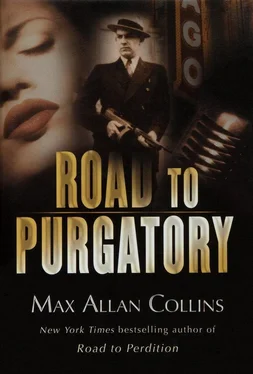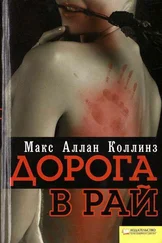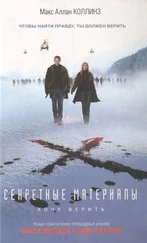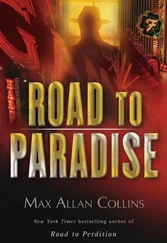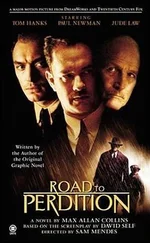As if chasing through mud they went, Michael at the rear, the bodyguards up ahead, the pair throwing rounds at the fleeing Nitti out in front, their shots cracking the air, sounding firecracker-small under the big gray sky.
Nitti only paused one more time, to toss a wild shot back at his pursuers, and then the man was slicing through the dead undergrowth toward the train tracks, where the grass and brush had been cut back to accommodate passage. Michael knew at once what Nitti was up to: the dark buildings of that sanitarium loomed, and the tracks went right by there, meaning the fugitive could find refuge among a wealth of witnesses; taking this road also allowed the little gangster to run faster, the topcoat flying behind him like a cape.
But Nitti also made himself a better target for his bodyguard pursuers, and two shots took the fedora right off him, sending it flapping away like a wounded bird.
Michael stopped running, planted himself, and aimed at the back of the Rat’s head; he squeezed the trigger and the bodyguard stopped dead, literally, his head coming apart in red and white and gray chunks.
Pocky, who was just a few steps behind Rat, almost fell over his own feet, coming to an astonished stop as he saw the corpse of his partner do a final limp bow, as if seeking applause before curling up awkwardly in the grass, just another dead animal.
Startled but enraged, Pocky wheeled and saw Michael coming and ran right at him, shooting the revolver. Michael fell face down on the grass and when Pocky ran over to check the body, the “corpse” reached up and shot him in the head.
Pocky’s face, with wide surprised eyes, one pockmarked cheek, and a single new red pock in his forehead, was haloed in his own prematurely gray hair and a mist of scarlet.
Then he, too, dropped, swallowed by weeds.
That left Nitti, about twenty-five yards up ahead, on the rail road tracks. He was clearly winded, and staggering along, not making much headway.
Michael quickly cut over to the tracks and was coming up behind the man when Nitti glanced back, saw him, and cut off the tracks, running through the grass to the dead end of more wire fencing.
Breath heaving, his back to the barrier, Nitti raised the revolver as Michael pushed through the grass, slowly now.
“Stop, Michael! Right there. Stop.”
Michael kept moving, brushing aside the prairie jungle. The .45 in his hand was held waist-high.
“I’m not going to let you do it!” Nitti said, his eyes wild, the little revolver pointing unsteadily at Michael.
“Mr. Nitti...”
Nitti laughed. “So respectful. Respectful to the end.” And Frank Nitti raised the revolver to his temple. “I don’t want to see you in hell, son. Understand? Okay?”
“Mr. Nitti!”
Nitti fired the .32.
Only a small spray of blood exited his left temple, and he slid like a cloth doll down the fence and sat slumped there, chin on his chest, the revolver loose in his hand.
Michael stood staring for several long seconds, then, shaking his head, said, “I wasn’t going to. I wasn’t going to...”
A clanging and a whistle and engine noise signaled an approaching train and, keeping low, Michael rushed through the grass as voices rose above the wind-whisper, two voices, back and forth, coming closer all the time, a flagman and a switchman, hanging off a forward-moving caboose:
“Shot himself!”
“You’re tellin’ me? I saw him do it!”
Retracing his path, more or less, Michael stayed low as he headed for the hole in the fence. He’d already slipped the .45 in its shoulder holster when he stepped through, to find a breathless Louie Campagna waiting.
“What the hell happened, kid?”
“Nitti’s bodyguards turned on him.”
“Pocky and Rat?”
“Yeah. They’re out there in the weeds, dead as hell. I made them that way.”
Michael felt sure Louie knew all about the turncoat bodyguards — else why was Campagna here? But he kept that to himself.
Together they walked across the street, back to the corner where Michael had revealed himself to Nitti. The neighborhood remained quiet, the sidewalks empty; it was as if the world had ended.
Campagna asked, “What about Frank?”
“He thought they had him cornered. Didn’t know I’d taken care of it. Turned his gun on himself.”
Shaking his head, genuine sorrow on his lumpy mug, Campagna said, “Aw. Ah hell. Ah Frank.”
Michael pointed toward the fence. “Cops’ll be here soon. Better have some men pull those stiffs out of the weeds, or this’ll get uglier than it has to.”
Campagna nodded, patting Michael on the back. “Done. You get the hell out of here, kid.”
Michael nodded.
He was just heading off when Campagna stopped him, with a hand on his arm.
“I know how you feel, kid.”
“What?”
Campagna swallowed thickly. “He was a great man.”
Michael didn’t know what the hell Campagna was talking about until, behind the wheel of the Ford, he saw his face in the mirror.
Saw the tears streaking his cheeks.
Michael Satariano and Patsy Ann O’Hara sat on the same stone bench in Huntley Park in DeKalb, Illinois, as last July Fourth. The cement-and-boulder bandshell was bare, and the park itself seemed abandoned. On this chilly afternoon in late March, under a sky as gray as gunmetal, Michael and Patsy Ann were rare sweethearts holding hands here.
They looked young, but then she was a college student and he wasn’t much older. He wore a brown leather jacket and chinos, she a soldier-blue wool coat and lighter blue slacks. Neither wore a hat, and an easy wind ruffled Patsy Ann’s blonde hair without really mussing it.
Michael sat staring at the empty bandshell. Frank Nitti was in the ground — hallowed ground, for this good Catholic who’d condemned himself to hell; on earth, at least, the fix was in. He’d left behind a loyal wife — who conveniently was at church, praying, during the killing — and a nine-year-old son he adored. Paul Ricca considered Michael to have been responsible for Nitti’s demise (officially suicide), and Louie Campagna had informed Michael — with a smile that said just how quickly Nitti had become yesterday’s news — that “the Satariano star” was rising.
This was the same Campagna who’d told Michael the way one leaves the Outfit, after the blood oath over dagger and gun: feet first. Nitti had left that way. His bodyguards, too, though they hadn’t even made the papers — Campagna’s Sicilian clean-up crew had quickly stowed them in the trunk of a car and, before any cops showed — or honest ones, anyway — whisked them into eternity. The pair were in a landfill by now (Mad Sam was in the garbage trade), or maybe at the bottom of Lake Michigan making it a foursome with Estelle Carey’s “friends,” the Borgias.
Michael knew all too well that Ness’s offer to help him parlay his Medal of Honor into some kind of government badge was no real option. Despite the Outfit’s reluctance to kill cops, particularly feds, a made man who became a G-man would surely be an exception.
Michael Satariano was one of them now. Like it or not.
At the Bella Napoli, Michael had sat with the Outfit’s new top capo at a rear table, just the two of them. Michael’s peculiar tastes were honored with an iced glass of Coca-Cola, while Paul Ricca again sipped an espresso. Bodyguards were on either side, at their own tables.
“Mr. Ricca,” Michael said, hands folded respectfully, “I am weary of bloodshed. I had my fill overseas, and found more awaited me here.”
Ricca’s eyes were hooded, though their dark brown seemed oddly gentle, in the angular, cruel face. “I understand. But a soldier goes where his general bids him go.”
Читать дальше
